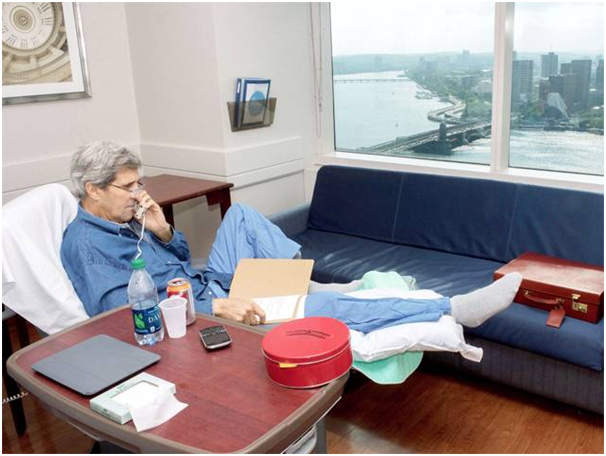US Drops Cover to Openly “Nudge” India and Pakistan to Keep Peace
“Hello”.... from Washington

NEW DELHI: There was a business angle to the Paris meeting between Prime Minister Narendra Modi and Pakistan PM Nawaz Sharif, but there was clearly international pressure forcing the two into amiable conversation, and from hostility on to the track of dialogue.
The pressure was subtle, in that given the sensitivities of India in particular, behind the curtains as it were with the US particularly worried about the “anti-Pakistan” position taken by New Delhi in both the external and domestic front. The occasional handshake notwithstanding it was clear to the international community, that India was ratcheting up its animosity towards Pakistan with talks being snapped, and a hardline position on terrorism.
Paris became the watershed in that the world leaders made it apparent to both that there was no option but talks, and that hostility in South Asia would not be acceptable. Sources, when asked what kind of pressure could have worked for PM Modi to give up the hardline approach and sink into talks as it were, said that a first step would be to drop the ‘hands off’ approach to Jammu and Kashmir that India managed after painstaking diplomacy, and re-convert Kashmir into an international issue at all levels. This would then undermine the Modi government’s claims about Jammu and Kashmir, where it is currently in coalition with the Peoples Democratic Party. And amount to a major diplomatic reversal.
The international stage has become important personally to PM Modi as well, and a lack of enthusiasm that a ‘no talks’ policy would entail in world capitals, would not fall in his scheme of things. Pakistan, of course, remains crucial to the US in its Afghanistan policy, and an essential factor in its plans for the region.
The US dropped the veil after the Pathankot terror attack and came out openly, through US State Department spokespersons, to urge both India and Pakistan to continue the talks. And made it very clear that any shift to the contrary would not be acceptable. Pakistan was at first given a clean chit, insofar as its ‘commitment’ to tackling terrorism was concerned but then amended more recently by US Secretary of State John Kerry who made it clear that Islamabad had no option but to cooperate and apprehend the masterminds of this terror attack.
Interestingly, this time around no one in Islamabad is denying a Pakistan hand in the terror attack, with PM Sharif repeating his resolve to ensure that justice is done in this case. And it is interesting to note that despite this, India has made no move to postpone or call off the foreign secretary level talks scheduled for January 14. This after an earlier round of talks was called off indefinitely after the Pakistan High Commissioner met, as has been the practice for a while now, Hurriyat leaders. But has not been after a terror attack. The Ministry of External Affairs spokesperson left the issue wide open in a recent briefing, with sufficient ‘ifs’ to ensure that while the question mark over the talks was not removed, it remained just about hanging.
The US does not want to open a front in South Asia at a time when West Asia seems to be spinning out of control.
A conflict between India and Pakistan, when Afghanistan is dominating its foreign policy, is a clear ‘no no’ and as the spate of statements from Washington clearly indicate, retaliation of any kind is not going to be acceptable. And that it is determined to ensure that India and Pakistan remain with the talks, with both the Sharifs in Pakistan under pressure to convince New Delhi that they are more than willing to act to bust the Pathankot terror ring. This assurance has come in so many words from Islamabad, to enable PM Modi then to convince his constituency that is wanting retaliatory action, that the pressure on Pakistan has produced results.
As sources point out, no one is looking for the end result to the terror attack but just sufficient face saving gestures to ensure that the talks remain on track. PM Modi’s visit to the Pathankot Air Force base has given a clean chit to the ‘operations’ that are now being projected as successful by the government. The rhetoric from both Islamabad and New Delhi is muted, with care being taken after Washington’s increasingly strident reminders, not to indulge in words that could snowball against the dialogue.
So far the strategy has worked, the US has openly urged Pakistan to find the perpetrators and take action, Pakistan has promised action, and India has kept the accusation level low.
So far, so good. Although PM Modi’s hardline constituency is not happy with the soft pedalling but is toeing the line, except for comments that escape every now and again on the social media.



